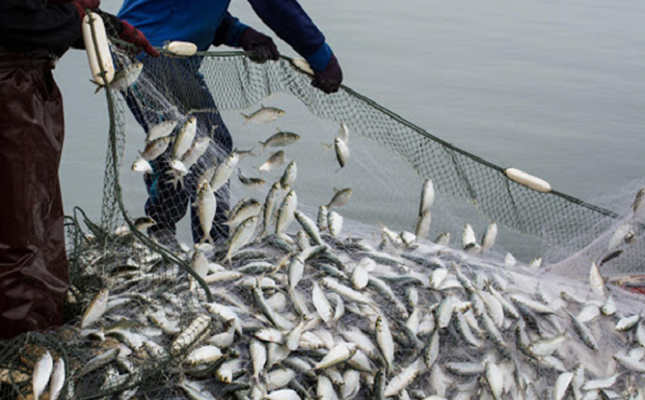When it comes to the topic of climate change, we continue to envision major catastrophes including strong hurricanes and rising sea temperatures, but its challenges are having an impact beyond what we see in front of us on a daily basis.
Scientists have, for years, warned that the continued emission of greenhouse gases will hasten the effects of climate change, especially for vulnerable Small Island Developing States (SIDS) like St. Kitts and Nevis (SKN).
The realities of the current predicament is hitting home within the fishing sector and alternatives are being sought to attain food security targets and achieve a more secure level of food sustainability.
Industrial-scale fishing has multiple negative impacts on the environment, decimation of fish populations, pollution, and habitat degradation. It also affects small-scale fisheries, by dominating the industry and the resources. This is unjust, unsustainable, and inequitable.
In comparison, the small-scale fishing sector does not contribute much to the issue of climate change, especially in the Caribbean region where greenhouse gas emission is minute.
Fisher people continue to feel the long term effects of climate change which goes beyond the seas. The sustainability of the trade for the men and women who use small fishing vessels and their families are under threat.
A flourishing fishing industry
In SKN, where there are more than 1,400 fisher people, the realities are stepping in and alternatives are being made to ensure that the sector flourishes. This includes providing the necessary training and equipment to ensure fisher men and women are at their best, and their safety and security is optimal.
Samal Duggin, Federal Minister of Agriculture, lamented to Climate Tracker that climate change is a real factor that is impacting the food sustainability within the territory, more specifically the fishing sector.
According to the Minister, coastal fishing is one of the areas they have found to have the most impact in the issue of climate change and the fishing sector. It generally means that finishes are no longer coming closer to shore for easy catch.
“We have now recognised that we have to go further out to sea. And yes, we recognised that we need to have differently modelled boats to traverse those waters, but also need to make sure that our FADS (Fish Aggregate Device) are attracting the right fish so that our fishermen can catch more on every trip,” the Minister explained.
Alarmingly for the fishermen, as they seek to venture out further, they risk encroaching on waters outside of SKN such as neighbouring territories like Antigua-Barbuda and Saint Maarten. That in and of itself can prove to be a challenge as they can be jailed for entering the waters illegally.
It is against that backdrop, that they have decided to deploy more FADS to increase the fish landings, which has been decreasing over the last several years. This has resulted in more Ocean Pelagic or deep water fishing to ensure that catches are at the targeted numbers.

What does this mean for small-scale fisheries?
SKN has been importing more food than it has been producing, including fish. According to Miguel Flemming, Permanent Secretary within the Agriculture Ministry, of the US$197 million food import bill for 2022 at least US$1.7 million was spent on fish.
Based on that finding, the government has set a target to increase production and catch to ensure that the people of the Federation are able to be self-sufficient.
In that case and taking into account the climate challenges as outlined by Duggins, the government is now considering developing a fish farm in order to attain its goals under the ‘25 by 2025’ Agenda and mitigate any challenges posed by climate change.
Under the ‘25 by 2025’ Agenda set out by the Caribbean Community (CARICOM), territories within the region will work to minimise their individual food import bills – collectively the region’s bill stands well over US$6 Billion.
In order to decrease the import bill, the government is moving to strengthen all facets of food security by producing more foods locally.
It is important to note that establishing a fish farm could hamper the livelihoods of fishermen who ply their trade on the high seas. However, it could also assist in minimising the number of fisher people who have disappeared at sea in recent years.
In underscoring that challenge, the Minister noted that more training will have to be undertaken within the sector to ensure that fisher people know what to do when they are lost at sea and how to use the monitoring systems for their vessels.
Fishing and health impacts
Emphasising the challenges associated with fishing outside of SKN’s exclusive economic zone, there was the discovery of large scale fish poisoning within the territory. Investigations showed the presence of arsenic within the fishes, which was connected to volcanic locations which are in neighbouring islands.
The test results from the Bureau of Standards indicate that there were no issues in relation to the fish handling or food preparation process. However, it indicates that there were elevated levels of arsenic in the fish samples.
The Ministry of Agriculture, Fisheries and Marine Resources is working with the Bureau of Standards to increase its response to health and nutritional concerns of the sector. The Ministry’s proposed Food Quality and Nutrition Security project looks at procuring fish testing equipment to determine the areas that have a propensity for fish poisoning.
The Ministry is also seeking to implement an additional project, which considers farming fish in controlled environments which would lower the risk of fish poisoning.
As the climate crisis continues to press into the region, it is going to be very important that funding be provided for these climate vulnerable countries to be able to protect fragile industries, such as the fishing industry, upon which we depend.
This story was published on Sknvibes with the support of the Caribbean Climate Justice Journalism Fellowship, which is a joint venture between Climate Tracker and Open Society Foundations.